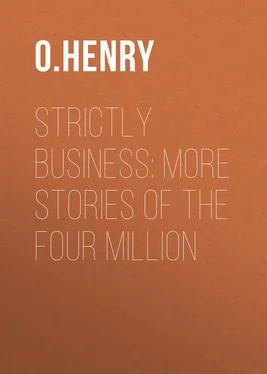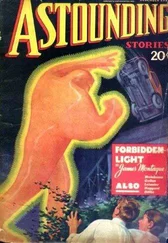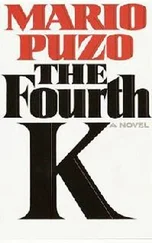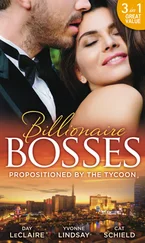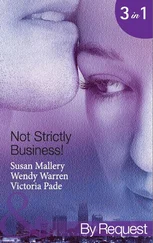O. Henry - Strictly Business - More Stories of the Four Million
Здесь есть возможность читать онлайн «O. Henry - Strictly Business - More Stories of the Four Million» — ознакомительный отрывок электронной книги совершенно бесплатно, а после прочтения отрывка купить полную версию. В некоторых случаях можно слушать аудио, скачать через торрент в формате fb2 и присутствует краткое содержание. Жанр: literature_20, foreign_prose, на английском языке. Описание произведения, (предисловие) а так же отзывы посетителей доступны на портале библиотеки ЛибКат.
- Название:Strictly Business: More Stories of the Four Million
- Автор:
- Жанр:
- Год:неизвестен
- ISBN:нет данных
- Рейтинг книги:4 / 5. Голосов: 1
-
Избранное:Добавить в избранное
- Отзывы:
-
Ваша оценка:
- 80
- 1
- 2
- 3
- 4
- 5
Strictly Business: More Stories of the Four Million: краткое содержание, описание и аннотация
Предлагаем к чтению аннотацию, описание, краткое содержание или предисловие (зависит от того, что написал сам автор книги «Strictly Business: More Stories of the Four Million»). Если вы не нашли необходимую информацию о книге — напишите в комментариях, мы постараемся отыскать её.
Strictly Business: More Stories of the Four Million — читать онлайн ознакомительный отрывок
Ниже представлен текст книги, разбитый по страницам. Система сохранения места последней прочитанной страницы, позволяет с удобством читать онлайн бесплатно книгу «Strictly Business: More Stories of the Four Million», без необходимости каждый раз заново искать на чём Вы остановились. Поставьте закладку, и сможете в любой момент перейти на страницу, на которой закончили чтение.
Интервал:
Закладка:
"Mr. Silver and Mr. Pescud," says Klein. "It sounds superfluous," says he, "to mention the name of the greatest financial – "
"Cut it out, Klein," says Mr. Morgan. "I'm glad to know you gents; I take great interest in the West. Klein tells me you're from Little Rock. I think I've a railroad or two out there somewhere. If either of you guys would like to deal a hand or two of stud poker I – "
"Now, Pierpont," cuts in Klein, "you forget!"
"Excuse me, gents!" says Morgan; "since I've had the gout so bad I sometimes play a social game of cards at my house. Neither of you never knew One-eyed Peters, did you, while you was around Little Rock? He lived in Seattle, New Mexico."
Before we could answer, Mr. Morgan hammers on the floor with his cane and begins to walk up and down, swearing in a loud tone of voice.
"They have been pounding your stocks to-day on the Street, Pierpont?" asks Klein, smiling.
"Stocks! No!" roars Mr. Morgan. "It's that picture I sent an agent to Europe to buy. I just thought about it. He cabled me to-day that it ain't to be found in all Italy. I'd pay $50,000 to-morrow for that picture – yes, $75,000. I give the agent a la carte in purchasing it. I cannot understand why the art galleries will allow a De Vinchy to – "
"Why, Mr. Morgan," says klein; "I thought you owned all of the De Vinchy paintings."
"What is the picture like, Mr. Morgan?" asks Silver. "It must be as big as the side of the Flatiron Building."
"I'm afraid your art education is on the bum, Mr. Silver," says Morgan. "The picture is 27 inches by 42; and it is called 'Love's Idle Hour.' It represents a number of cloak models doing the two-step on the bank of a purple river. The cablegram said it might have been brought to this country. My collection will never be complete without that picture. Well, so long, gents; us financiers must keep early hours."
Mr. Morgan and Klein went away together in a cab. Me and Silver talked about how simple and unsuspecting great people was; and Silver said what a shame it would be to try to rob a man like Mr. Morgan; and I said I thought it would be rather imprudent, myself. Klein proposes a stroll after dinner; and me and him and Silver walks down toward Seventh Avenue to see the sights. Klein sees a pair of cuff links that instigate his admiration in a pawnshop window, and we all go in while he buys 'em.
After we got back to the hotel and Klein had gone, Silver jumps at me and waves his hands.
"Did you see it?" says he. "Did you see it, Billy?"
"What?" I asks.
"Why, that picture that Morgan wants. It's hanging in that pawnshop, behind the desk. I didn't say anything because Klein was there. It's the article sure as you live. The girls are as natural as paint can make them, all measuring 36 and 25 and 42 skirts, if they had any skirts, and they're doing a buck-and-wing on the bank of a river with the blues. What did Mr. Morgan say he'd give for it? Oh, don't make me tell you. They can't know what it is in that pawnshop."
When the pawnshop opened the next morning me and Silver was standing there as anxious as if we wanted to soak our Sunday suit to buy a drink. We sauntered inside, and began to look at watch-chains.
"That's a violent specimen of a chromo you've got up there," remarked Silver, casual, to the pawnbroker. "But I kind of enthuse over the girl with the shoulder-blades and red bunting. Would an offer of $2.25 for it cause you to knock over any fragile articles of your stock in hurrying it off the nail?"
The pawnbroker smiles and goes on showing us plate watch-chains.
"That picture," says he, "was pledged a year ago by an Italian gentleman. I loaned him $500 on it. It is called 'Love's Idle Hour,' and it is by Leonardo de Vinchy. Two days ago the legal time expired, and it became an unredeemed pledge. Here is a style of chain that is worn a great deal now."
At the end of half an hour me and Silver paid the pawnbroker $2,000 and walked out with the picture. Silver got into a cab with it and started for Morgan's office. I goes to the hotel and waits for him. In two hours Silver comes back.
"Did you see Mr. Morgan?" I asks. "How much did he pay you for it?"
Silver sits down and fools with a tassel on the table cover.
"I never exactly saw Mr. Morgan," he says, "because Mr. Morgan's been in Europe for a month. But what's worrying me, Billy, is this: The department stores have all got that same picture on sale, framed, for $3.48. And they charge $3.50 for the frame alone – that's what I can't understand."
IV
THE DAY RESURGENT
I can see the artist bite the end of his pencil and frown when it comes to drawing his Easter picture; for his legitimate pictorial conceptions of figures pertinent to the festival are but four in number.
First comes Easter, pagan goddess of spring. Here his fancy may have free play. A beautiful maiden with decorative hair and the proper number of toes will fill the bill. Miss Clarice St. Vavasour, the well-known model, will pose for it in the "Lethergogallagher," or whatever it was that Trilby called it.
Second – the melancholy lady with upturned eyes in a framework of lilies. This is magazine-covery, but reliable.
Third – Miss Manhattan in the Fifth Avenue Easter Sunday parade.
Fourth – Maggie Murphy with a new red feather in her old straw hat, happy and self-conscious, in the Grand Street turnout.
Of course, the rabbits do not count. Nor the Easter eggs, since the higher criticism has hard-boiled them.
The limited field of its pictorial possibilities proves that Easter, of all our festival days, is the most vague and shifting in our conception. It belongs to all religions, although the pagans invented it. Going back still further to the first spring, we can see Eve choosing with pride a new green leaf from the tree ficus carica .
Now, the object of this critical and learned preamble is to set forth the theorem that Easter is neither a date, a season, a festival, a holiday nor an occasion. What it is you shall find out if you follow in the footsteps of Danny McCree.
Easter Sunday dawned as it should, bright and early, in its place on the calendar between Saturday and Monday. At 5.24 the sun rose, and at 10.30 Danny followed its example. He went into the kitchen and washed his face at the sink. His mother was frying bacon. She looked at his hard, smooth, knowing countenance as he juggled with the round cake of soap, and thought of his father when she first saw him stopping a hot grounder between second and third twenty-two years before on a vacant lot in Harlem, where the La Paloma apartment house now stands. In the front room of the flat Danny's father sat by an open window smoking his pipe, with his dishevelled gray hair tossed about by the breeze. He still clung to his pipe, although his sight had been taken from him two years before by a precocious blast of giant powder that went off without permission. Very few blind men care for smoking, for the reason that they cannot see the smoke. Now, could you enjoy having the news read to you from an evening newspaper unless you could see the colors of the headlines?
"'Tis Easter Day," said Mrs. McCree.
"Scramble mine," said Danny.
After breakfast he dressed himself in the Sabbath morning costume of the Canal Street importing house dray chauffeur – frock coat, striped trousers, patent leathers, gilded trace chain across front of vest, and wing collar, rolled-brim derby and butterfly bow from Schonstein's (between Fourteenth Street and Tony's fruit stand) Saturday night sale.
"You'll be goin' out this day, of course, Danny," said old man McCree, a little wistfully. "'Tis a kind of holiday, they say. Well, it's fine spring weather. I can feel it in the air."
"Why should I not be going out?" demanded Danny in his grumpiest chest tones. "Should I stay in? Am I as good as a horse? One day of rest my team has a week. Who earns the money for the rent and the breakfast you've just eat, I'd like to know? Answer me that!"
Читать дальшеИнтервал:
Закладка:
Похожие книги на «Strictly Business: More Stories of the Four Million»
Представляем Вашему вниманию похожие книги на «Strictly Business: More Stories of the Four Million» списком для выбора. Мы отобрали схожую по названию и смыслу литературу в надежде предоставить читателям больше вариантов отыскать новые, интересные, ещё непрочитанные произведения.
Обсуждение, отзывы о книге «Strictly Business: More Stories of the Four Million» и просто собственные мнения читателей. Оставьте ваши комментарии, напишите, что Вы думаете о произведении, его смысле или главных героях. Укажите что конкретно понравилось, а что нет, и почему Вы так считаете.
